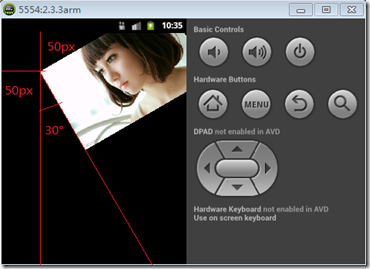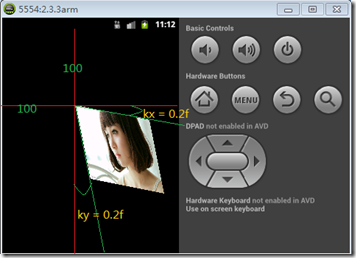Android中强大的Matrix及图像变换操作
一: 简介
Matrix翻译字面意思时矩阵,在Android的API中提供了两种Matrix,分别是android.graphics.Matrix 和 android.opengl.Matrix .
后者是OpenGL中的 , 是 一个四行四列的 矩阵. 主要是3D 效果,导包的时候,注意
前者是我们比较常用的, 是一个三行三列的矩阵 , 主要是2D方面的.主要主要用于图像的处理,主要功能有 缩放[Scale] ,平移[Translate] ,旋转[Rotate],倾斜[Skew]等操作.
其中 rotate 操作涉及到的参数是:MSCALE_X,MSKEW_X,MSKEW_Y,MSCALE_Y
translate操作涉及到的参数是:MTRANS_X,MTRANS_Y
scale操作涉及到的参数是:MSCALE_X,MSCALE_Y
skew操作涉及到的参数是:MSKEW_X,MSKEW_Y
更多的相关操作详见 http://blog.csdn.net/forlong401/article/details/8174452
二:注意事项
图像的处理, Translate用到了矩阵的加法,其他操作则用到的是矩阵的乘法 :
sinX 和 cosX :表示旋转角度的 cos 值和 sin 值(逆时针为正) ;
translateX 和 translateY: 表示 x 和 y 的平移量 ;
scale 是缩放的比例, 1 是不变, 2 是表示缩放 1/2。
除平移变换(Translate)外,旋转变换(Rotate)、缩放变换(Scale)和错切变换(Skew)都可以围绕一个中心点来进行,如果不指定,在默认情况下是围绕(0, 0)来进行相应的变换的。
三: 简单使用
自定义View:
package com.example.matrixdemo; import android.content.Context; import android.graphics.Bitmap; import android.graphics.Canvas; import android.graphics.Matrix; import android.graphics.drawable.BitmapDrawable; import android.util.AttributeSet; import android.view.View; public class MyView extends View { private Bitmap mBitmap; private Matrix mMatrix = new Matrix(); public MyView(Context context, AttributeSet attrs, int defStyle) { super(context, attrs, defStyle); initialize(); } public MyView(Context context, AttributeSet attrs) { this(context, attrs, 0); } public MyView(Context context) { this(context, null); } private void initialize() { mBitmap = ((BitmapDrawable) getResources().getDrawable(R.drawable.mm)) .getBitmap(); float cosValue = (float) Math.cos(-Math.PI / 6); float sinValue = (float) Math.sin(-Math.PI / 6); mMatrix.setValues( //缩放1/2 ,平移(100,100),旋转30° new float[] { cosValue, -sinValue, 100, sinValue, cosValue, 100, 0, 0, 2 }); } @Override protected void onDraw(Canvas canvas) { super.onDraw(canvas); canvas.drawBitmap(mBitmap, mMatrix, null); } }XML:
<?xml version="1.0" encoding="utf-8"?> <com.example.matrixdemo.MyView xmlns:android="http://schemas.android.com/apk/res/android" android:layout_width="match_parent" android:layout_height="match_parent" > </com.example.matrixdemo.MyView>Activity:
package com.example.matrixdemo; import android.app.Activity; import android.os.Bundle; public class MatrixRotate extends Activity { @Override protected void onCreate(Bundle savedInstanceState) { super.onCreate(savedInstanceState); setContentView(R.layout.my_view); } }运行效果:
注意: 因为缩小了一半,所以平移了50
四:相关API
如果只是这样设置值的话.还要计算好半天,很麻烦,google为我们提供了响应的API.针对每种变换,Android提供了pre、set和post三种操作方式
set用于设置Matrix中的值。
pre方法表示矩阵前乘,例如:变换矩阵为A,原始矩阵为B,pre方法的含义即是A*B
post方法表示矩阵后乘,例如:变换矩阵为A,原始矩阵为B,post方法的含义即是B*A
简单理解:
matrix.preScale(0.5f, 1); matrix.preTranslate(10, 0); matrix.postScale(0.7f, 1); matrix.postTranslate(15, 0);等价于:
translate(10, 0) -> scale(0.5f, 1) -> scale(0.7f, 1) -> translate(15, 0)调用的pre的操作先执行,调用的post的操作则后执行。
set方法是调用即
覆盖之前matrix中的所有变换,
matrix.preScale(0.5f, 1); matrix.setScale(1, 0.6f); matrix.postScale(0.7f, 1); matrix.preTranslate(15, 0);等价于
translate(15, 0) -> scale(1, 0.6f) -> scale(0.7f, 1)matrix.preScale (0.5f, 1)将不起作用。
同样满足pre后调用先执行原则,只是set之前的值无效.
五: API使用实例
比如我们要将一个图片旋转60°,之后平移(100,100)
//
Matrix m = new Matrix(); m.postRotate(60); m.postTranslate(100, 100); //或者: Matrix m = new Matrix(); m.setTranslate(100 , 100 ); m.preRotate(60);自定义View
package com.example.matrixdemo; import android.content.Context; import android.graphics.Bitmap; import android.graphics.Canvas; import android.graphics.Matrix; import android.graphics.drawable.BitmapDrawable; import android.util.AttributeSet; import android.view.View; public class MyView extends View { private Bitmap mBitmap; private Matrix mMatrix = new Matrix(); public MyView(Context context) { this(context, null); } public MyView(Context context, AttributeSet attrs, int defStyle) { super(context, attrs, defStyle); initialize(); } public MyView(Context context, AttributeSet attrs) { this(context, attrs, 0); } private void initialize() { Bitmap bmp = ((BitmapDrawable) getResources() .getDrawable(R.drawable.mm)).getBitmap(); mBitmap = bmp; /* * 缩放到100*100;这里需要注意前面是float值 */ mMatrix.setScale(100f / bmp.getWidth(), 100f / bmp.getHeight()); // 平移到(100,100) mMatrix.postTranslate(100, 100); // 以(100,100)为中心,倾斜x和y轴 mMatrix.postSkew(0.2f, 0.2f, 100, 100); } @Override protected void onDraw(Canvas canvas) { super.onDraw(canvas); canvas.drawBitmap(mBitmap, mMatrix, null); } }
运行效果:






 浙公网安备 33010602011771号
浙公网安备 33010602011771号